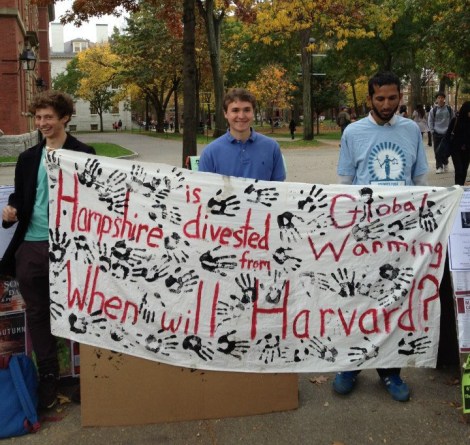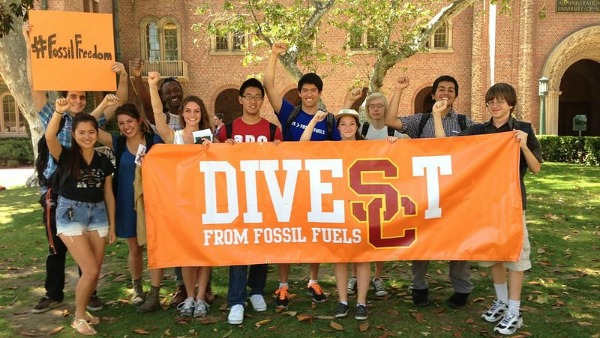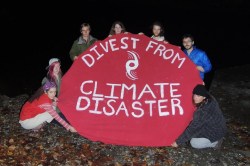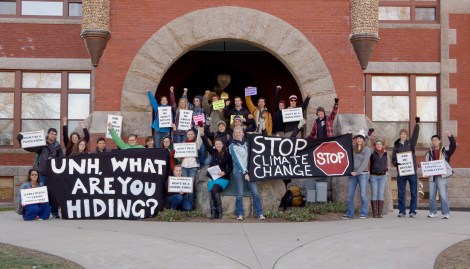I admit to being relatively ignorant about the fossil fuel divestment campaign until several months ago, when some of my peers at Northwestern University proposed a resolution establishing Northwestern as a leader in environmental sustainability, a move that pissed off our president and even inspired its own hashtag, #divestNU. For a while after that, I was excited to see college students rallying around something larger than a 40-second keg stand (admittedly impressive). Hey — at least we know what a smart investment in the future looks like, even if we can’t always make one ourselves. But then I educated myself further and I got angry. Here’s why.
Basically, a divestment movement involves students asking their universities to stop investing money in institutions still directly or indirectly supporting archaic, damaging traditions, the theory being that moral pressure from concerned shareholders, as well as financial pressure from the threat of losing major investors, can force change. In the 1980s, the divestment movement targeted companies based in or doing business with apartheid-era South Africa (movement leaders point to the University of California’s $3 billion withdrawal of investments from the country as key to helping end apartheid rule there). Today, the movement takes aim at a few gassy, bloated Fortune 500 companies. If all of humanity were a gas addict named Joe, Fossil Fuel Inc. is the guy keeping his lips on the pipe, and Joe is paying Fossil Fuel Inc. for that service. So we undergrads are intervening to reroute the cash flow away from Fossil Fuel Inc. and toward someone who can help Joe imagine a future beyond the next fix.
Though I love this idea in theory, I’m frustrated with how it’s playing out in practice. Despite students at 308 college campuses clamoring for divestment, only six schools have agreed to withdraw their investments from harmful energy companies in full — and not one of those has an endowment over $1 billion. (For context: Large research universities like Northwestern and Yale have endowments of $7 billion and $19.7 billion, respectively.)
Three cheers for the little guys, but am I being unreasonable in wanting educational bigwigs to divest, too? One would think that our country’s bastions of enlightened thought would take the lead on such a movement, especially when you consider the many climate change communication studies they sponsor (despite employing the odd tenured climate denialist). Moral reasons aside, it seems kind of dumb to invest in an apocalypse; after all, if I know about the carbon bubble, I sure hope that a bunch of financial experts do.

350.orgNew England’s Hampshire College was one of the first schools to pledge to divest from fossil fuels.
So with these things in mind, I set out to find out why no large universities have made any sort of divestment agreement (with one notable exception). The first question I hoped to answer was whether divestment is a stupid financial move — if, by rinsing out their oily investments and plunging them into fresher stocks, universities were risking heavy losses.
The answer? A resounding “Hellll no.” One study [PDF] by the Impax Asset Management Group in London tracked two portfolios over seven years: one with investments in energy companies like Exxon and BP and one without. The clean portfolio made 2.3 percent returns per year. The fossil fuel guys netted 1.8 percent.
Hmmm.
And there’s the carbon bubble, which I mentioned earlier. HSBC Holdings PLC, one of the largest banks in the world, just published a national analysis showing that if we want to keep global temperatures from climbing more than 2 degrees C (which will still do this, this, and this to us,) we’d have to keep two-thirds of our coveted oil reserves from ever seeing the light of day. If we throw caution to the wind and burn all our fossil-fuel reserves, we’re looking at a 6-degree increase, which means we’re definitely screwed. But keeping it in our proverbial pants means fossil fuel companies will see their value slashed in half. So if it’s economically smart to divest, why aren’t the smart schools doing it?
The short answer is that money is complicated. Most of these bigger schools manage indirect investments, or money that third parties have invested in certain companies and sectors through the university’s financial management team. Many of these third parties are wealthy old alumni and hedge funds, so rerouting their indirect investments is tough (though maybe not quite as tough as living will be for the 40 countries predicted to flood by 2040). Asking them to divest is sort of like asking Kim Jong-Un to pedal a bike across Korea — unlikely to be received or executed well.
“It’s very difficult to completely restructure investments,” admitted Chloe Maxmin, a rising Harvard junior and ambassador to 350.org. “Most of the funds are in third-party investing mechanisms. Harvard’s investors have to wait until contracts with these funds expire … to tell them that they don’t want to be investing in fossil fuels.”
For now, Maxmin and her peers are focusing on direct investments — the assets that Harvard’s team can move without angering third parties. When I reached out to the team for their opinions on the matter, however, the response I received was less than forthcoming.
Four days after I called and emailed the Harvard office asking to speak with someone, I received an email from Kevin Galvin, Harvard’s communications manager. “The investment managers at HMC do not typically grant interviews regarding their decision-making or investment practices,” he wrote, “but if you send me some specific questions I could see what I can find out for you.” I emailed him a list of questions; he never responded. Four other universities didn’t even reply to my initial query.
Regardless of whether these schools divest or not, the debate would certainly benefit from more transparency.
Transparency has helped Unity College. A tiny school nestled in 300 acres of sprawling Maine farmland, Unity has a bite-sized endowment of $14 million, but “it is subject to market forces like any other,” sustainability director Jesse Pyles maintained.
According to Pyles, Unity’s assets are entirely divided into exchange-traded funds, which Pyles defined as “baskets of money” with primary areas of focus. Fossil fuel companies fall into an “energy-sector basket.” So divestment was a piece of cake; all Unity had to do was pull its cash out of the offending baskets and place it somewhere else. The only financial impact has been positive, as Unity’s decision has attracted both donors and prospective students.
Should we hold every college to Unity standards? No way: It’s tiny, all of its 560 students are majoring in sustainability-related programs, and practically nobody’s heard of it. If Harvard divested and upset a bunch of its wealthy alumni, the press would flip.
But then I realized: That’s kind of why the big schools need to take the lead. Because fossil fuel divestment is ultimately a symbolic movement (after all, the biggest energy companies make $400 billion of revenue in a single year, 1,300 percent more than Harvard’s $30 billion sum total), it’s up to the big-name colleges with a lot of eyes trained on them to spearhead the movement. If even a marginally bigger school like San Francisco State University (its endowment is around $50 million) won’t respond to requests for comment about its June agreement to divest, then what school will? According to my one, harried phone conversation with a spokeswoman, the SFSU president has avoided discussing the plans because they “are in the early stages.” Couldn’t the early stages be a good time to at least discuss the intentions of a program?
Granted, the divestment movement is still moving ahead of schedule, if activist Bill McKibben is to be believed. “The good yardstick is what happened with the South Africa campaign … and that took years,” McKibben said. “We’ve seen a lot of progress in just a few months.”
It takes patience to change big establishments. But sometimes it’s tough to be patient, especially when you’re a young idealist watching the world around you melt.





